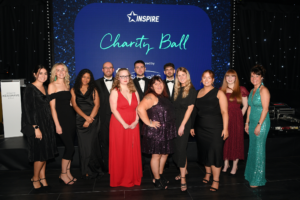We use cookies to personalise content, to monitor site traffic and deliver targeted advertising. We also share information about your use of our site with our social media and advertising partners who may combine it with other information that you've provided to them or that they've collected from your use of their services.
View Cookie Policy

Young People and children in Suffolk are feeling the strain of return to school
Data from the government’s Mental Health and Wellbeing Surveillance Report found that, since the return to school in autumn, mental wellbeing among pupils has declined, with Year 11 pupils feeling the greatest impact.
While groups such as primary school children have benefitted from a return to school, others – such as female pupils and those with pre-existing mental health needs – have found the transition difficult.
Since Inspire launched its virtual Wellbeing Service a year ago, 400 local children and young people (aged 10-25) have accessed the service. We have recently received an increased number of self-referrals from pupils who are struggling to transition back into their old lives.
Sharon Michell, BACP Accredited Counsellor at Inspire, explains, “While some of us might be glad to see restrictions easing, many young people who access our service are feeling overwhelmed or anxious about facing the world again. For some, the lockdown offered a respite from bullying or social anxiety but as life starts returning to normal, these issues have returned, and they are feeling overwhelmed.
“Over the past few months, we’ve received more calls from young people who are struggling with the stress of exams, have felt they may get in trouble for falling behind or are having problems reintegrating.”
Sharon Michell added that providing the necessary support isn’t always easy as young people can be reluctant to draw attention to themselves, might be embarrassed, or shy away from voicing problems for fear of them feeling more ‘real’.
This issue has been compounded by long NHS waiting lists and fewer opportunities for privacy at home reducing the opportunities for accessing mental health support when they need it.
“It is important for young people to know that they are not alone and that there is reliable support out there when they are ready to seek help.”
One young person phoned the Wellbeing Service when anxiety about exams was affecting her sleep, appetite, and physical health. Through one-to-one virtual sessions, her counsellor helped her to explore the pressure she was feeling, set boundaries and keep a good routine. As a result, she is now eating properly again feels like the weight has lifted.
She explained, “You have to trust in the counselling process as originally, I didn’t think it was going to work, yet I have now been able to deal with stress much better and completed my exams without stressing. I wasn’t worried about what I had or hadn’t done, and I could focus on the task at hand.”
What happens in an Inspire counselling session?
In our very first session, we spend time listening to young people to find out where they are in their lives and what is troubling them most. Often, the reason they seek counselling is part of a bigger issue, so we discuss how we can work together over the coming sessions to help them feel more able to manage their mental health in a positive way.
Our counsellor, Sharon, is an integrative counsellor, so she will encourage clients to talk, explore their emotions and look at how past experiences can influence how we feel in the present. Every client is unique, so sessions are shaped by their own experiences. We will often look at repeated patterns, defence mechanisms and recognising feelings as they happen.
Sharon’s motto is, counselling is about the client “understanding their story, to accept their story and to then be able to respect their story.” Once this has been achieved clients can recognise their triggers which could be unconscious bringing it into the conscious which means clients can then work with the issue, which then could mean that the client then doesn’t feel overwhelmed or consumed by feelings or emotions.
If you are aged 10-25 and think you could benefit from free one-to-one counselling, please text or call 07720 087487. Inspire also offer a range of education programmes, designed to support wellbeing, break down barriers, and build confidence. Find more information, here.



